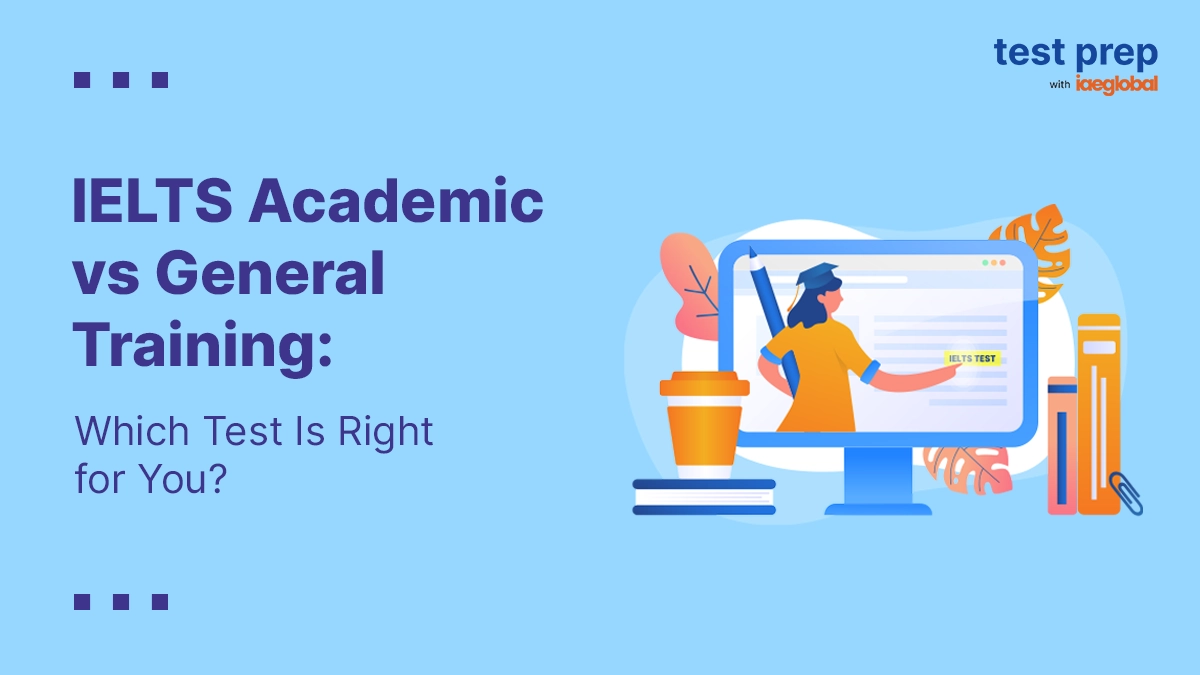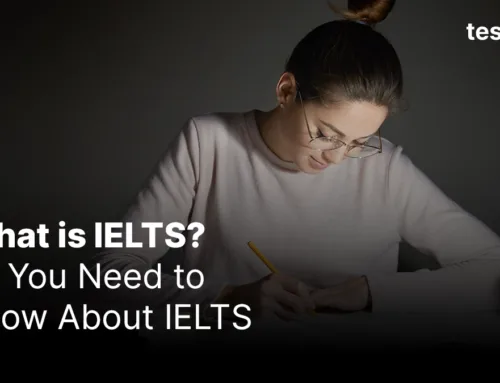
The main difference between IELTS Academic and IELTS General Training is their purpose and the type of people they are meant for.The Academic version is for those seeking entry into universities, while the General Training version is more commonly used for migration purposes. Which option you choose will rely on how you want to apply your test results. The IELTS Academic version is mostly required by universities, whereas the General Training version is frequently accepted by migration agencies. To make sure you select the right version, it’s crucial to confirm the particular criteria of the company where you intend to work or study before scheduling your test.
IELTS Academic Vs General: Test Format
The IELTS exam is offered in two formats: Academic and General Training. Both versions evaluate your listening, reading, writing, and speaking skills. However, they differ in certain aspects, with varying content focus and slight differences in format. Below is a table outlining the details of the IELTS format.
| IELTS Test Components | IELTS Academic | IELTS General |
| Reading | 40 questions (3 passages), Duration: 60 minutes | 40 questions (3 sections), Duration: 60 minutes |
| Writing | 2 tasks (Graphs Essay), Duration: 60 minutes | 2 tasks (Letter Essay), Duration: 60 minutes |
| Listening | 40 questions (4 sections), Duration: 30 minutes + 10 min for answer transfer | |
| Speaking | 3 parts (Introduction, Cue Card, Discussion), Duration: 11-14 minutes | |
IELTS Academic vs IELTS General Training: Definition
IELTS Academic is for people who want to study or work in English-speaking countries. It checks if you are ready to learn or train in English. Many countries like the US, UK, Canada, Australia, and New Zealand accept this test.
IELTS General Training is for individuals looking to migrate to New Zealand, Australia, Canada, the US, or the UK, or for those applying for secondary education, training programs, and work experience in English-speaking settings. This test evaluates everyday English skills for social and workplace situations and is often used for immigration purposes.
Breakdown of the IELTS Test Format
The IELTS test has four parts: Writing, Reading, Listening, and Speaking. It takes a total of 2 hours and 45 minutes to complete all sections. Candidates must take the Listening, Reading, and Writing tests one after the other on the same day, with no breaks. The Speaking test can be scheduled on the same day or up to a week before or after the other tests, depending on the test center’s schedule.
Test Format Options
Candidates can choose to take the test on paper or on a computer. The questions and format are the same for both, but the main difference is how you record your answers.
Detailed Description of Each IELTS Section
IELTS Academic vs. General Reading
IELTS Academic Reading: Candidates read three longer passages aimed at a university level, with various types of questions. The texts come from sources like books, journals, and newspapers.
IELTS General Training Reading: This test features 5-6 shorter texts from everyday sources, such as advertisements and company handbooks, and includes 40 questions of different types.
IELTS Academic vs. General Listening
The Listening test is the same for both IELTS Academic and General Training. It consists of four recorded texts, including two monologues and two conversations, with accents from British, Australian, New Zealand, and North American speakers. The test covers everyday situations as well as educational contexts, featuring a total of 40 questions with various formats.
IELTS Academic vs. General Writing
IELTS Academic Writing: This section includes tasks like describing visual information from graphs, charts, or diagrams.
IELTS General Training Writing: Candidates write letters in response to specific situations. Both sections require candidates to write essays on given topics or arguments.
IELTS Academic vs. General Speaking
Similar to the Listening test, the Speaking test is the same for both versions. It has three parts and evaluates how well candidates can communicate. The first part involves answering general questions about personal interests, while the later parts require deeper discussions on more abstract topics.
How are IELTS test scores calculated?
| IELTS Band Score | Level |
| 9 | Expert |
| 8 | Very Good |
| 7 | Proficient |
| 6 | Competent |
| 5 | Modest |
| 4 | Limited |
| 3 | Extremely Limited |
| 2 | Intermittent |
| 1 | Denied |
| 0 | Did Not Attend |
Choosing the Right IELTS Test for You
Choosing between the IELTS Academic and IELTS General Training tests depends on your personal goals and the requirements of the institution or organisation you are applying to. Here’s how to determine which option suits you best:
Select IELTS Academic if you:
- Plan to study at the undergraduate or postgraduate level in a country where English is the primary language of instruction.
- Need a Student Route visa (Tier 4) to enroll at a UK university that supports this visa type.
- Are you a physician or nurse, seeking license or certification in an English-speaking nation?
- If you wish to work for a professional body in an English-speaking region, especially in careers that require proof of English proficiency.
Choose IELTS General if you:
- Need to work or undertake work-related training in an English-speaking environment. This is appropriate for people who want to strengthen their talents or obtain real-world work experience.
- Are you moving to a nation that speaks English, like the UK, Canada, Australia, or New Zealand? For immigration purposes, IELTS General Training is frequently necessary.
- demand fluency in English for specific visa categories in these nations, or you must find another work in your own country where a recognised command of the English language is necessary.
Eligibility for IELTS Academic vs IELTS General
| Eligibility for IELTS Academic | Eligibility for IELTS General |
| Minimum age is 16. | Used for immigration visas in various countries. |
| A passport is required for registration. | UK: Band score of 7.0 needed for Tier 1 General visa. |
| No score limits; varies by university. | Other Tier 1 visas require 4.0 in each section. |
| High scores can lead to top institution admission. | Canada: CLB 7 for Federal Skilled Worker; 6.0 in each for English. |
| Federal Skilled Trades require a band score of 5.0. | |
| Australia: Scores depend on profession; 6.0 for Competent, 5.0 for Vocational. | |
| New Zealand: Band score of 6.5 required for skilled migrant visas. |
What are the exam fees for IELTS Academic and IELTS General?
The fees for both the IELTS Academic and IELTS General tests are the same. To register for your IELTS test, you need to pay ₹17,000.
The test fee in India may vary depending on the type of test. Payments can be made using a credit card, debit card, demand draft, or by depositing cash at an authorised bank.
Steps to Schedule Your IELTS Exam Date and Location
- Go to the British Council’s official website and select “Register.”
- Click on “Find Test Date” and provide your city, the month, and the module you want.
- You’ll be directed to a page showing available test dates.
- Select a suitable date and click on “Apply.”
Conclusion
In conclusion, knowing the differences between the IELTS Academic and General Training tests is important for making the right choice for your needs. The Academic version is intended for those seeking higher education, while the General Training version is typically used for migration purposes. Before you book your test, check the specific requirements of the institution or organisation you want to apply to.
Both tests evaluate your listening, reading, writing, and speaking skills, but they differ in content and format. Preparing for the correct test can greatly influence your success. Whether you select the Academic or General Training version, achieving a high score will support your goals, whether it’s gaining admission to a university or obtaining a visa for a new country.





